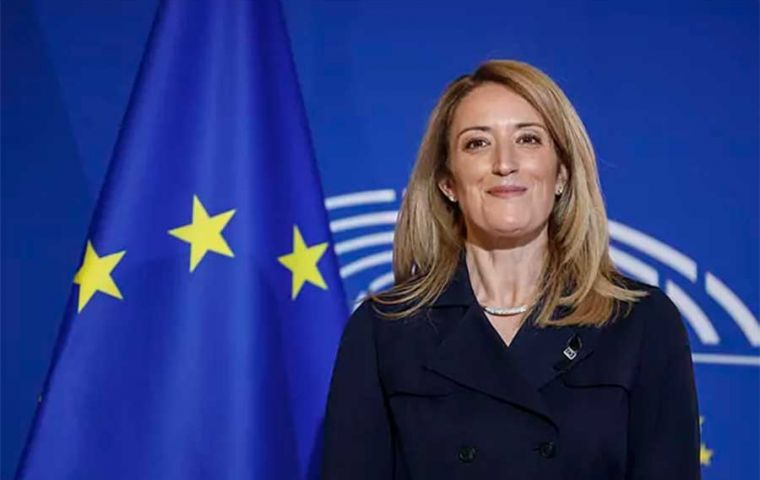MercoPress. South Atlantic News Agency
After years of fierce debate, EU parliament passes tough migration and asylum rules
 Roberta Metsola, president of EU Parliament wrote, that the pact had been ten years in the making, but “history has been made.” (Pic AP)
Roberta Metsola, president of EU Parliament wrote, that the pact had been ten years in the making, but “history has been made.” (Pic AP)  European Commission President Ursula von der Leyen said the pact would increase efficiency in processing asylum applications.
European Commission President Ursula von der Leyen said the pact would increase efficiency in processing asylum applications. Sweeping reforms in the Europe Union migration and asylum rules with the purpose of managing the ongoing phenomenon which has caused for years a major turmoil in the EU and among its members.
The new historic EU Asylum and Migration Pact, approved on Wednesday by the EU Parliament intends to manage the rejection of invalid applications and by sharing the burden of requests more evenly among member states. It also includes controversial detention centers for rejected cases to be deported back to countries of origin.
The vote came after years of fierce debate between conservative and liberal lawmakers and EU northern and southern members, and since in 2023 asylum applications reached another high.
Roberta Metsola, the president of the European Parliament, wrote on y Twitter, that the pact had been ten years in the making. “History has been made. We have delivered a robust legislative framework on how to deal with migration and asylum in the EU,” she said.
European Commission President Ursula von der Leyen said the pact would increase efficiency in processing asylum applications.
The changes to the EU's migration system still need to be confirmed by member state ministers, possibly by late April, before it can enter into force in 2026. Member states signing off, however, is seen as a formality.
Under the new system, migrants illegally entering the EU will undergo identity, health and security checks, including biometric readings of faces and fingerprints, within seven days. The procedure aims to determine which migrants should receive an accelerated or normal asylum application process, and which ones should be sent back to their country of origin or transit.
Children are to receive special treatment, with countries obliged to install independent monitoring mechanisms to ensure rights are upheld.
Asylum-seekers from countries whose nationals' applications are generally rejected — such as Tunisia, Morocco and Bangladesh, for example — are to be fast-tracked in detention centers close to the EU's external borders, enabling them to be deported quicker.
The controversial centers, located at land borders, ports and airports, will be able to house up to 30,000 people at any period, with the EU expecting up to 120,000 migrants to pass through them annually.
Critics, however, fear that such border facilities could encourage systematic detention and undermine human rights.
The plan was drawn up after 1.3 million people, mostly those fleeing war in Syria and Iraq, sought refuge in Europe in 2015. The EU's asylum system collapsed, with reception centers in Greece and Italy becoming overwhelmed.
The political key to winning support for the proposals is reform to the EU's so-called “Dublin III” mechanism which determines which member state is responsible for processing any individual asylum application.
Generally, the European country in which an asylum-seeker first arrives has been responsible for handling their case, placing a greater strain on southern countries such as Italy, Greece and Malta.
Under the new rules, the “first-country” principle will remain but additional measures including a “mandatory solidarity mechanism” would oblige other member states to shoulder a fairer share of the burden.
If other member states are unwilling or unable to physically host asylum-seekers while their cases are being processed, they can assist financially or by providing extra personnel.
Soon after the vote passed, Polish Prime Minister Donald Tusk said that his government would “protect” Poland from the migrant relocation mechanism. “We will find ways so that even if the migration pact comes into force in roughly unchanged form, we will protect Poland against the relocation mechanism,” Tusk told reporters.
Although Tusk's governing alliance is largely pro-EU, it maintains criticism of the EU's migration reform.
Hungarian Prime Minister Viktor Orban wrote on X formerly Twitter, that the pact was a “nail in the coffin” for the EU. “Secure borders are no more, Hungary will never give in to the mass migration frenzy,” Orban wrote.




Top Comments
Disclaimer & comment rulesCommenting for this story is now closed.
If you have a Facebook account, become a fan and comment on our Facebook Page!